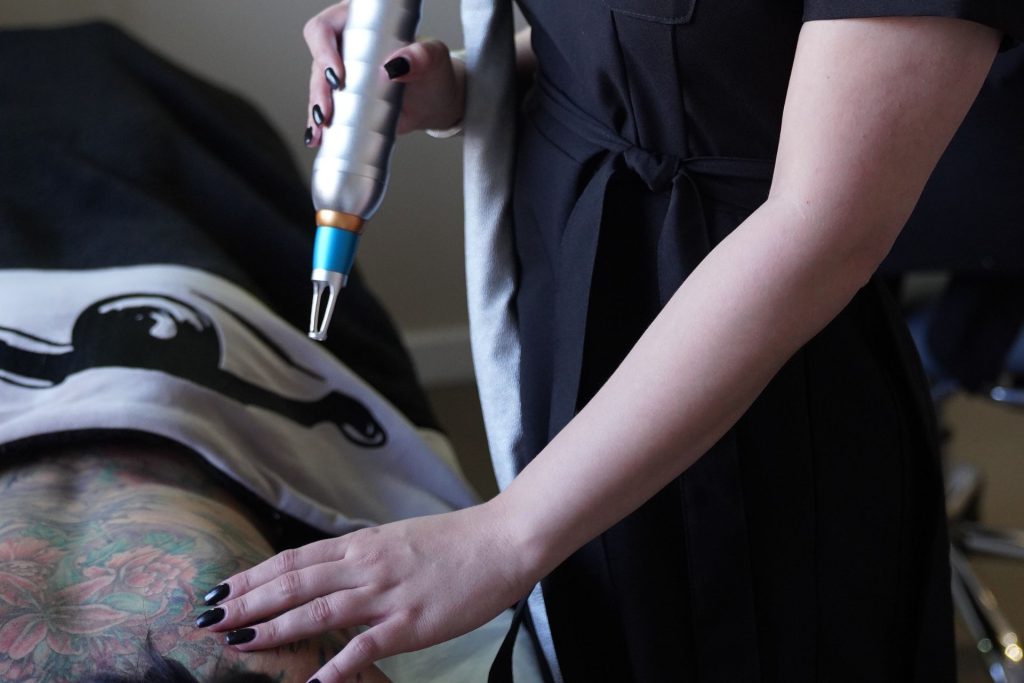
In Iowa, over 2 million* people are expected to have at least one tattoo. Considering opening up a tattoo removal clinic in Iowa? Read this article for an in-depth study of the Iowa tattoo removal market, state laser regulations, start-up requirements, etc.
Tattoo Removal Business Start Up
When starting a tattoo removal business, there are several crucial things to consider, plan, and implement. For a step-by-step guide to starting a tattoo removal business, click here. This article covers important aspects of building a tattoo removal business start-up including:
- Tattoo removal equipment choices
- Types of laser tattoo removal machines
- Tattoo removal business space
- Marketing and business plan
- Training and hiring
- Tattoo removal business profitability, and
- Licenses, state regulations, and insurance
For a detailed analysis of which insurance covers the business might need, click here.
It ultimately comes down to this: laser tattoo removal. Laser removal has emerged as the go-to treatment. It is effective and comparatively safe, being a non-invasive skin treatment. A laser tattoo removal clinic can be a highly profitable business.
Laser Tattoo Removal Iowa Market Size
Not everyone loves their tattoo forever. According to Harris Poll (2015), almost a quarter of people with tattoos suffer from tattoo regret. In fact, the tattoo removal market is currently witnessing a huge expansion. It is set to grow into a $795 million market by 2027 at a growth rate of 19.3% (Allied Market Research). Over 2 million people in Iowa have at least one tattoo. Many of these tattooed individuals will face tattoo regret too. And when they do start looking for removal options, this tattoo removal clinic in Iowa can emerge as their savior.
Iowa Laser Regulations For Tattoo Removal

In Iowa, the Iowa Board of Medical Examiners regulates the medical sector. Back in 2006, the Board had accepted the report furnished by the Ad Hoc Committee on the Use of Lasers, Intense Pulsed Light Devices, and Radio-Frequency Devices. The committee had been created to regulate the use of lasers and other light-based devices, given the safety risks of its improper use. The report discussed different parameters concerning such procedures, such as delegation, training, supervision, and emergencies. However, it was not legally binding.
Rule 653.13.8 under Chapter 13 of the Iowa Administrative Code (Standards of Practice and Principles of Medical Aesthetics) codified the rules of delegation and supervision for medical aesthetic services. A medical aesthetic service has been defined as
“…the diagnosis, treatment, or correction of human conditions, ailments, diseases, injuries, or infirmities of the skin, hair, nails and mucous membranes by any means, methods, devices, or instruments including the use of a biological or synthetic material, chemical application, mechanical device, or displaced energy form of any kind if it alters or damages or is capable of altering or damaging living tissue below the superficial epidermal cells, with the exception of hair removal.”
According to this rule, a medical aesthetic service is a practice of medicine that can be delegated to a ‘qualified licensed or certified nonphysician person’ only under the supervision of a licensed physician. Tattoo removal is also considered to be a medical aesthetic procedure.
It is important to keep in mind that these rules & regulations apply specifically to medical spas and are not applicable to any licensed medical facilities, practices, and clinics. A medical spa is any entity, apart from legitimate dermatology practices, that advertises, announces, establishes, or maintains itself to offer medical aesthetic services. A ‘qualified licensed or certified nonphysician person’ entails any individual who, although not authorized to practice osteopathic medicine and surgery, holds a license or certification from any other Iowa Licensing Board and is qualified to perform medical aesthetic services under the medical director’s supervision. The medical director is the physician responsible for the medical oversight of the facility.
Rules of Delegation
The medical aesthetic service that is delegated should not only be within the concerned physician’s area of expertise, but should also be just a ‘routine, technical service’ that does not require the skills and competency of a licensed physician. It must also be considered to be within sound medical judgement to delegate.
Rules of Supervision
The medical director is responsible for all procedures delegated to qualified licensed or certified nonphysician persons. The physician must take care of these following things:
- Personally evaluate the competency and skills of the nonphysician personnel by reviewing their education, training, ability, and experience.
- Make sure the individual does not perform any procedure not covered under their license/certification, unless under the supervision of the medical director.
- The medical director is required to provide direct, in-person oversight at least 4 hours a week. This must also be documented.
- The supervising physician must also give first-hand feedback to the qualified licensed/certified nonphysician person on their performance every week and assess atleast 10% of patient charts.
- The medical director must be within 60 miles of the facility at all times.
- The medical director must be available for emergencies, either physically or through electronic communication. It is also their responsibility to set up protocols that the qualified licensed or certified nonphysician must follow in situations of injuries or emergencies.
- The supervising physician must also examine all equipments and technologies being used by the qualified licensed or certified nonphysician persons to ensure they are safe and up to standard.
- It is also their responsibility to ensure the nonphysician personnel maintain accurate patient records.
- Ensure that the licensure, certification, and identity of both the medical director and the other nonphysician personnel is put up at a visible location in the facility and also given in writing to each client.
- The medical director must ensure that informed consent of each client is taken and documented.
Iowa Laser Regulations For Tattoo Removal (In short):
In Iowa, laser tattoo removal can be performed by a qualified licensed or certified nonphysician person but only under the supervision of the medical director (direct, on-site supervision for atleast 4 hours a week.)
Iowa Business Resources & Support
Many organizations and government departments help new businesses start and run efficiently. Some of them are:
- The Iowa Department of Revenue offers important information on taxes, permits, certificates, registration, and other legal requirements for new business owners.
- The Iowa Small Business Development Center Network provides support and assistance to existing and new businesses through its various training programs and free consultation service.
- The Iowa branch of SBA (Small Business Administration) also has a lot to offer. The SBA is not only a storehouse of information but also provides networking opportunities through its various small business events.
- Score is a non-profit organization offering educational resources and advice and mentorship from business experts.
- The Iowa Economic Development Authority (IEDA) has several programs and resources for small businesses. The certified Targeted Small Business (TSB) Program provides support to women, individuals with minority status, service-connected disabled veterans, and individuals with disabilities who wish to open or grow their businesses. The IA SourceLink program provides a database of the different licenses the state has in place for running different kinds of businesses. It also helps connect entrepreneurs with not-for-profit organizations offering resources to small businesses.
Note: This article does not offer legal advice or interpretation.
*Based on statistics from https://www.ipsos.com/en-us/news-polls/more-americans-have-tattoos-today




